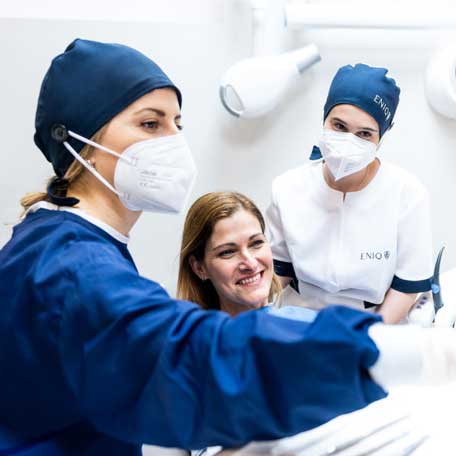

Removable Dental Prosthesis
Discover high-quality removable dental prostheses at ENIQ Madrid.
What is a Removable Dental Prosthesis?
Removable prostheses on dental implants are prosthetic devices used to replace missing or lost teeth. These prostheses are designed to be placed over dental implants, which are metallic or titanium structures inserted into the maxillary or mandibular bone to act as artificial roots.
Unlike fixed prostheses, removable prostheses can be easily removed and replaced by the patient. These prostheses consist of a metal structure that connects to the dental implants and an acrylic or resin base that holds the artificial teeth.
The main advantage of removable prostheses on dental implants is their stability and retention. Dental implants provide a solid and secure base for the prosthesis, allowing for better masticatory function and speech compared to conventional removable dentures. Additionally, removable prostheses on implants are more comfortable and stable, preventing movement or slippage of the prosthesis during use.
These prostheses are also easy to clean and maintain. They can be removed for daily cleaning, allowing for proper oral hygiene and preventing the buildup of bacterial plaque.
It is important to note that removable prostheses on dental implants require proper care and follow-up by a dentist. The dental professional will make the necessary adjustments and regularly assess the health of the implants and surrounding tissues to ensure optimal functioning of the prosthesis.
In our center, we can place the implants very precisely with incisions of just 3mm and without sutures, and you leave with the prosthesis in place. Minimally invasive surgery that only ENIQ can do thanks to its large investment in R&D and cutting-edge technology.
Types
How many types of dental prostheses are there?
There are different types of removable prostheses on dental implants, which adapt to the needs and preferences of each patient.
Below, we mention some of the most common types:

-
Implant-supported overdentures:
These are complete prostheses that are placed on dental implants. They are held and stabilized by ball connections, clip-type anchors, or metal bars, providing greater retention and stability compared to conventional complete dentures. -
Hybrid prostheses on implants:
These prostheses consist of a metal structure that is permanently fixed to the dental implants. They provide a more fixed and stable solution, as they cannot be removed by the patient. Fixed bridges can replace several lost teeth and offer excellent masticatory function and aesthetics. -
Ball or Locator anchors:
These are retention systems that use a ball and socket connection to join the dental implants with the removable prosthesis. These anchors provide a firm hold and allow a precise fit of the prosthesis. -
Additional Type:
Description of the additional type of dental prosthesis, highlighting its unique features and benefits for the patient.

Detailed Information on Removable Prostheses
Removable Prosthesis on Two Dental Implants
Removable prostheses on two dental implants, also known as overdentures with ball or snap buttons, are a common option for restoring dental function and aesthetics when two dental implants are present in the maxilla or mandible. These prostheses offer greater stability and retention compared to conventional removable prostheses that rely solely on the soft tissues of the mouth.
The general procedure typically involves the following steps:
- Placement of the implants: Two dental implants are placed in strategic locations in the maxilla or mandible. These implants act as anchors for the removable prosthesis.
- Adaptation of the implants: Abutments or pillars are placed on the implants. These abutments are structures that protrude from the implants and provide a solid base for the prosthesis.
- Impressions: Impressions of the mouth are taken to create a custom prosthesis that fits correctly to the shape of the patient's mouth.
- Manufacturing of the prosthesis: In the dental laboratory, the removable prosthesis is made using the impressions taken. It is designed to have snaps or buttons that fit over the abutments of the implants.
- Final adjustment and placement: Once the removable prosthesis is ready, an adjustment is made to ensure a proper and comfortable fit. Then it is placed in the mouth and its stability and functionality are checked.
These removable prostheses on two dental implants provide greater retention and stability compared to conventional prostheses, allowing the patient to speak, eat, and smile with more confidence. Additionally, they can be removed for daily cleaning and maintenance.
Remember, it's important to consult with a dentist specializing in implantology to assess your specific case and determine if removable prostheses on two dental implants are a suitable option for you.
In our center, we can place the implants very precisely with incisions of just 3mm and without sutures, and you leave with the prosthesis in place. Minimally invasive surgery that only ENIQ can perform thanks to its large investment in R&D and cutting-edge technology.
What is the price of removable prostheses on dental implants?
The average price of a dental implant in Spain, throughout this year 2023, is 1,550 euros.
However, we can find implants priced from 1,000 to 2,200 euros. This difference in cost can depend on several factors, which are explained below.
Experience of the Implantologist
As in any other profession, the experience and training of the professional are factors to consider.
The professional's fees depend on aspects such as their training or experience.
Generally, an implantologist with many years of experience and specialized training will have higher fees. However, they will also offer a higher guarantee of success in their treatments.
Quality of the Dental Implant
Currently, there are more than 200 brands of implants with prices varying widely based on their design, materials, scientific backing, studies, etc.
It's important to use high-end implants and avoid clone or imitation implants.
This is the best way to prevent issues, such as implant breakage or the onset of peri-implantitis.
Quality of the Crown
Another fundamental element in the cost of the implant is the material used to replace the lost dental piece.
For example, a metal-porcelain crown or cap is cheaper than a zirconium-porcelain crown.
The latter option offers greater durability and aesthetics and, therefore, its price is higher.
Additionally, it's important to consider that the crown is manufactured in a prosthetic laboratory. The greater the technicians' ability to achieve the ideal aesthetics, the higher the cost of the crown will be.
Quality of the Abutment and Attachments
The abutment is the element that connects the dental implant with the crown or dental prosthesis. Attachments (healing screws, burnable or impression caps) are all materials used during the surgical and prosthetic phase.
Here too, we find that, on one hand, there are the official abutments and attachments for each implant brand (more expensive).
On the other hand, there are compatible components made by third parties (cheaper).
Technology and Technique Used
Both the technology and technique used play a fundamental role in dental implant treatments: they help plan the procedure, shorten the surgery time, and reduce postoperative discomfort.
For example, there are several techniques that, while providing great comfort to the patient, also increase the price of the treatment:
- Guided surgery: allows the intervention to be planned in advance by computer. This enables the implantologist to perform surgery through a minimal incision, reducing postoperative discomfort.
- Immediate loading: the main benefit it provides is that it allows the crown to be loaded on the same day of the surgery. With this, the patient will not have to be without a tooth at any time. In contrast, traditional surgery requires the patient to be without a tooth for about three months.
- Conscious sedation: is a technique that reduces anxiety and nerves. With it, the patient remains relaxed during the entire surgery.
Hybrid Prosthesis on Implants
Complete Solution
*subject to specialist assessment
Hybrid prostheses on implants are one of the solutions we have when we want to replace the entire mouth with implants. As mentioned in the previous section, the price of this treatment ranges between 15,000 and 20,000 euros.
-
All-inclusive
-
Interest-free financing
Services
All rights reserved © ENIQ Clinic 2025
Legal Notice · Privacy Policy · Cookie Policy
